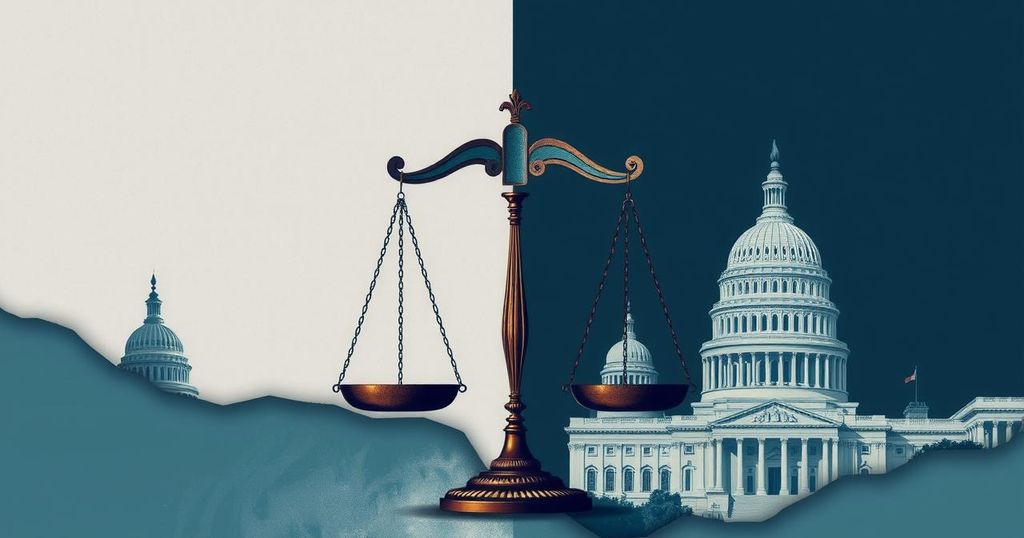The Dismemberment of Democracy in Nigeria

President Tinubu’s administration has increasingly undermined democracy in Nigeria through electoral mismanagement, nepotism, and a consolidation of power. Key democratic principles, like the separation of powers and equal representation, are being eroded as opposition parties face significant challenges. The 2027 elections loom, highlighting the urgent need for citizens to protect their democratic rights in the face of rising authoritarianism.
Democracy, by its very nature, embodies equal opportunity for all citizens. It hinges on principles of accountability, tolerance, accessibility, adherence to the law, and the separation of powers among the judiciary, legislature, and executive branches. However, over the past two years, the administration of President Bola Ahmed Tinubu has evidenced a stark departure from these ideals, leading to failures across vital sectors: economy, security, and governance.
Unfortunately, the Independent National Electoral Commission (INEC), positioned to oversee voter registration and participation, has fallen woefully short of expectations. Throughout election cycles since 2015, the APC government has only managed to provide Permanent Voter Cards (PVCs) to around 30% of applicants, effectively disenfranchising millions of Nigerians. This pattern of electoral mismanagement casts a long shadow over the integrity of democratic processes in the nation.
Moreover, nepotism has permeated appointments within Tinubu’s government. While the principle of Federal Character was intended to ensure representation for all ethnic groups, Tinubu has largely favored his Yoruba kin, often appointing friends and political allies. This blatant disregard for meritocracy and fairness raises serious concerns about the administration’s commitment to inclusive governance. For instance, in the awarding of the Lagos-to-Calabar Coastal Road project—worth a staggering 700 billion dollars—Tinubu bypassed due processes, unilaterally directing the contract to a well-known associate, without input from the National Assembly or a bidding process.
The separation of powers is another democratic principle that has faced significant erosion under Tinubu. His administration has systematically undermined the checks and balances that should exist between the executive, judicial, and legislative branches, consolidating power in a worrying manner. Moreover, he often speaks on behalf of his ministers and party officials, centralizing authority and diminishing the role of other government institutions.
As democracy falters under the Tinubu administration, a concerning trend is emerging toward a one-party state. He has aggressively undermined the main opposition party, the PDP, even going so far as to plant spies within its ranks. Similarly, smaller parties like the Labour Party are being destabilized. The smear campaigns against notable figures, such as Peter Obi, illustrate the extent of this concerted effort to consolidate power.
In a quintessentially autocratic move, Tinubu recently declared himself the sole candidate for the APC in the next presidential election, without any formal voting or input from party members. This action starkly contradicts democratic norms and demonstrates a flagrant abuse of authority. With intentions to position the APC as the sole political party in Nigeria, Tinubu is seemingly intent on circumventing any opportunity for genuine political competition.
As Nigeria approaches the 2027 general elections, it is imperative for all citizens to actively resist these attempts at silencing opposition and eroding democratic rights. The pressing need for citizens to assert their rights to political choice cannot be overstated, as Tinubu’s actions aim to usurp these vital freedoms. This call to action reflects the ongoing struggle to reclaim a semblance of democracy in Nigeria.
In summary, Nigeria’s democracy faces significant threats under President Tinubu’s administration. His disregard for democratic principles, manipulation of electoral processes, and consolidation of power signal a concerning trend towards autocracy. The upcoming 2027 elections present a crucial opportunity for citizens to unite against these undemocratic moves and safeguard their right to vote and choose their leaders. It is essential that the Nigerian populace stands firm in defending their democratic rights and resists any attempts at establishing a one-party rule.
Original Source: tribuneonlineng.com








